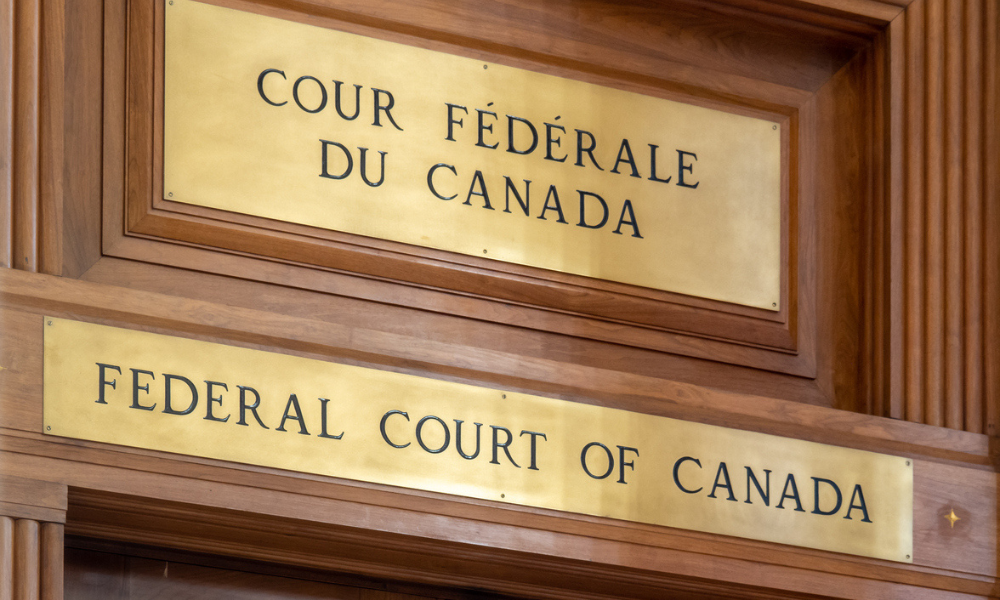
Federal court cases this coming week include a class action alleging breaches of Charter rights

This coming week, hearings scheduled before the Federal Court involved matters relating to insurance, alleged copyright infringement, emergency wage subsidies, environmental law, and class proceedings claiming breaches of rights under the Canadian Charter of Rights and Freedoms.
The court set Aviva compagnie d'assurance du Canada c. Société Terminaux Montréal Gateway, T-1171-24 on July 2, Tuesday. The plaintiff was a legally constituted company duly authorized to carry on an insurance business in Quebec. The plaintiff claimed that the defendant should pay it the sum of $100,000 following the reimbursement of the insurance indemnity.
The court scheduled Yelda Haber Ve Görsel Yayincilik A.S. v. GLWiZ Inc. et al., T-206-21 on July 3, Wednesday. The plaintiff was allegedly a television broadcasting undertaking and enterprise headquartered in Istanbul, Turkey that created, owned, broadcasted, and streamed original entertainment programs.
The defendants, on the other hand, allegedly operated a Canadian-based global internet protocol television service that delivered multicultural programming via internet streaming. The plaintiff filed a copyright infringement action claiming that the defendants broadcasted and distributed its programs without a license.
The defendants denied infringement and argued that they were authorized to broadcast the works. They brought a discovery motion seeking to compel answers to questions that were the subject of an earlier ruling or questions that could have been asked at the initial examination.
On June 6, 2023, in Yelda Haber Ve Görsel Yayincilik A.S. v. GLWiZ Inc., 2023 FC 778, the Federal Court ordered the plaintiff to answer certain questions and directed the defendants to pay the plaintiff costs fixed at $3,500. The court also ordered the service of further documents responsive to these questions.
The court set Araya v. The Attorney General of Canada, T-261-22 on July 3, Wednesday. The plaintiff, a Canadian citizen of Eritrean descent, claimed that officials of the Correctional Service of Canada and fellow inmates subjected him to racial abuse while he was incarcerated. He filed a motion to certify the proceeding as a class action.
The defendant argued that there were no common factual and legal issues, that the proposed class was overly broad and indeterminate, that the proposed class proceeding was not the preferable procedure for resolving the claims, and that the plaintiff was not a suitable class representative and failed to disclose reasonable causes of action.
On Dec. 13, 2023, in Araya v. Canada (Attorney General), 2023 FC 1688, the Federal Court certified this proceeding as a class action and appointed him as representative plaintiff. The court’s order defined the class, set the class period, and stated the common factual and legal questions for the class.
The class claims included systemic negligence resulting in the abuse of Black inmates and breaches of ss. 7 and 15(1) of the Charter. The relief requested by the class included punitive damages at common law and under s. 24 of the Charter.
The court scheduled Construction Gauthier Entrepreneur Général Inc. c. PGC, T-857-23 on July 3, Wednesday. This judicial review application asked the court to annul a decision relating to the refusal of applications for the Canada emergency wage subsidy. The applicant asked the court to order the Canada Revenue Agency to pay it wage subsidies requested for certain periods.
The court set Carling et al v AGC, T-1510-23 on July 3, Wednesday. The applicants alleged that uranium mine waste rock, which originated from uranium mines operated by Rio Algom Limited, contaminated their properties. The applicants claimed that they were exposed to harmful doses of radiation.
The court scheduled Rosebrook v. Hill Times Publishing Inc./Publications Hill Times Inc., T-1702-23 on July 4, Thursday. This case arose when the plaintiff brought a simplified action for infringement of copyright and moral rights.
The plaintiff and one of the defendants, the Canadian Anti-Hate Network, could not agree on when the documents in the plaintiff’s list of documents should be served. The defendant wanted them immediately so that discovery questions could be prepared. The plaintiff, on the other hand, argued that the defendant would receive the documents as a part of the answers to discovery questions.
Last Mar. 26, in Rosebrook v. Hill Times Publishing Inc., 2024 FC 474, the Federal Court exercised its discretion under rr. 54, 55, and 385 of the Federal Courts Rules, SOR/98-106 and ordered the plaintiff to produce to all the parties a copy of every document included in the list of documents served in line with r. 295. The court also directed the plaintiff to pay costs of the motion to the defendant.